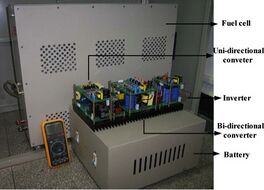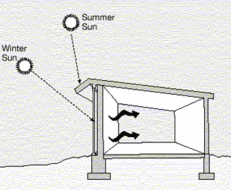
This is the main page for CMAS 801 Topics in Applied Sustainability (Winter 2011), the core Queen's University, The Stephen J.R. Smith Faculty of Engineering and Applied Science at Queen’s University course for the Masters in Applied Sustainability. Please leave comments using the discussion tab.
Instructors
- Dr. Pearce -225 Nicol
Co-Instructors
- Dr. Mabee
- Dr. Anderson
- Professor Vic Pakalnis - 325B Goodwin
Description[edit | edit source]
Applied sustainability is the application of science and innovation to meet human needs while indefinitely preserving the life support systems of the planet. This course provides an overview of the field with particular focus on implementation of engineering solutions. The course will be divided into three sections in which the technical and policy-related issues will be explored: 1) Sustainable Energy Technologies, 2) Sustainability and Fresh Water Systems and 3) Sustainable Resource Management.
In the first section, the engineering necessary to transition from a nuclear and fossil fuel-based energy system to one utilizing a portfolio of sustainable energy technologies will be detailed. The use of thermodynamics, energy, and dynamic life cycle analyses will be used to provide the basis for comparison between technologies.
In the second section, energy policy in Canada will be discussed, and students will have the opportunity to apply sustainability principles in designing a new energy strategy for Canada.
In the third section, society's unsustainable use of water will be examined and changes utilizing ecological principles and biomimicry necessary to meet the goal of long-term strategic and sustainable fresh water systems will be analyzed.
In the final section, the historically challenging problem of resource management will be studied to provide safe, environmentally friendly and socially benign methods of resource extraction and waste disposal.
In each section, emphasis will be given to the policy relevance of topics covered, including our ability to measure sustainability, develop lower-risk strategic plans and integrate technical concepts into planning and design.
Course Materials[edit | edit source]
No required materials -- readings will be made available online, in class or via loans.
Additional Materials[edit | edit source]
- Cradle to Cradle: Remaking the Way We Make Things (Paperback)by William McDonough and Michael Braungart, 2002.
- Cuddihy J, Kennedy C, Byer P (2005) Energy use in Canada: environmental impacts and opportunities in relationship to infrastructure systems. Can. J. Civ. Eng. 32:1-15.
- Issa R, Lafrance R, Murray J (2008) The turning black tide: energy prices and the Canadian dollar. Can. J. Econ. 41(3):737-759.
- James P (1993) Energy politics in Canada, 1980-1981: threat power in a sequential game. Can. J. Pol. Sci. 26(1):31-59.
Course Organization[edit | edit source]
The course will be broken up into four main components taught by an expert in the sub-field of Applied Sustainability (energy, policy, water, and resources). Lectures will concentrate on the presentation of theory with some simple examples. There will be a project for each of the sub-fields.
Course website: https://www.appropedia.org/CMAS801
Course Marking[edit | edit source]
| Projects | Percent |
|---|---|
| CMAS801 Sustainable Energy Project | 25 |
| CMAS801 Energy Policy Project | 25 |
| CMAS801 Sustainable Water Project | 25 |
| CMAS801 Sustainable Resource Project | 25 |
| Total | 100 |
Late Penalty[edit | edit source]
- Deduct 10% per day, up to 5 working days, then 0 mark. Only exception is for documented illness – Reg. 5d) – missed projects are penalized by the negative square of the percent total.
Policy on Academic Dishonesty – Plagiarism:
Schedule (by week)[edit | edit source]
- Energy 1 (Introduction)
- Introduction to course, What is applied sustainability? What is green washing?
- The standard model vs. Open Source Energy Development by the DOE
- CMAS801 Sustainable Energy Project Assigned
- Energy 2 (The Problem)
- Energy Basics and The Sustainable Energy Challenge
- Climate change[1][2] and Energy cannibalism[3][4]
- Can we buy our way out? Use of Life Cycle Economics to drive energy sustainability.[5][6]
- Energy 3 (The Solutions)
- Policy 1 (Canada's energy sector)
- What does Canada's energy sector look like, and why is it important? CMAS801 Sustainable Energy Project due
- CMAS 801 Energy Policy Project Assigned
- Class reading: Cuddihy et al. 2005 Energy use in Canada
- Policy 2 (Canadian energy policy)
- A review of the National Energy Program
- The current situation
- Role of the provinces and international trade
- Class readings: (1) Issa et al 2008 The turning black tide: energy prices and the Canadian dollar (2) James 1993 Energy politics in Canada, 1980-1981
- Policy 3 (Developing a Canadian energy strategy)
- In-class presentations on CMAS 801 Energy Policy Project
- Team analysis and strategy synthesis (2 teams of 3-4)
- Strategy presentation (2 teams) and discussion
- Water 1- Global water issues: struggles to secure water sources, and conflicts arising from limitations in resources and use/misuse of water; Canadian water resources perspectives; sustainable approaches to water resource uses and source water protection
- Water 2 - Urbanization and water resource impacts: stormwater management present and future (low impact development)
- Water 3 - Sanitation and water quality: urban approaches vs. unserviced/on site approaches to protect water resources
- Resources 1: Mining Industry – national and global perspectives - mining cycle - impact on Aboriginal Communities
- Resources 2: Rehabilitation and Tailings Disposal – Field Trip
- Resources 3: National and international standards for sustainable development in mining practice
References
- ↑ Climate Change 2007: The Physical Science Basis. Contribution of Working Group I to the Fourth Assessment Report of the Intergovernmental Panel on Climate Change. http://www.ipcc.ch/pdf/assessment-report/ar4/wg1/ar4-wg1-spm.pdf
- ↑ United States National Academy of Sciences, Understanding and Responding to Climate Change http://americasclimatechoices.org/climate_change_2008_final.pdf
- ↑ R. Kenny, C. Law, J.M. Pearce, “Towards Real Energy Economics: Energy Policy Driven by Life-Cycle Carbon Emission”, Energy Policy 38, pp. 1969–1978, 2010. Available: http://dx.doi.org/10.1016/j.enpol.2009.11.078
- ↑ J. M. Pearce, “Thermodynamic Limitations to Nuclear Energy Deployment as a Greenhouse Gas Mitigation Technology”, International Journal of Nuclear Governance, Economy and Ecology 2(1), pp. 113-130, 2008. http://dx.doi.org/10.1504/IJNGEE.2008.017358
- ↑ J. M. Pearce, D. Denkenberger, and H. Zielonka, “Accelerating Applied Sustainability by Utilizing Return on Investment for Energy Conservation Measures” International Journal of Energy, Environment and Economics, 17(1), pp. 61-80, 2009.
- ↑ K. Branker and J. M. Pearce, “Financial Return for Government Support of Large-Scale Thin-Film Solar Photovoltaic Manufacturing in Canada” Energy Policy 38, pp. 4291–4303 (2010). http://dx.doi.org/10.1016/j.enpol.2010.03.058
Additional Resources[edit | edit source]
Energy[edit | edit source]
Energy Related Journals[edit | edit source]
- Akshay Urja ( 2005 ) Renewable Energy newsletter of the Indian Ministry of New and Renewable Energy
- Applied Energy 1.006 (2006)
- Boiling Point ( 1982 ) Boiling Point is a practitioner’s journal for those working with household energy and stoves
- Cogeneration & Distributed Generation Journal
- Distributed Generation and Alternative Energy Journal This new journal replaces the Cogeneration and Distributed Generation Journal - quarterly publication of the Association of Energy Engineers (AEE),published by Taylor & Francis, four (4) issues per year.
- Energy 1.172(2007)
- Energy Economics
- Energy and the Environment (severe delay, editors are climate change skeptics, see wikipedia's entry on them)
- Energy & Environmental Science new
- Energy Journal 0.707 (2005) - covers energy economics
- Energy Policy (2010:2.436)
- Energy Sources 0.465 (2005)
- International Journal of Global Energy Issues (IJGEI)
- International Journal of Energy, Environment and Economics
- The Journal of Fundamentals of Renewable Energy and Applications new open access for fee
- International Journal of Photoenergy (2010:1.494) open access
- International Journal of Sustainable Energy - new
- International Journal of Energy Research 0.380 (2005)
- Journal of Engineering for Sustainable Development: Energy, Environment, and Health
- Journal of Global Energy Issues - new
- Journal of Renewable and Sustainable Energy New 2008 AIP journal
- Journal of Solar Energy Engineering
- Proceedings of ICE, Energy (new 2007)
- Renewable Energy 0.795 (2005)
- Solar Energy 0.868 (2005)
- Solar Energy Materials and Solar Cells 2.002(2005)
Policy[edit | edit source]
- Cuddihy et al 2005 Energy use in Canada
- Issa et al 2008 The turning black tide: energy prices and the Canadian dollar
- James 1993 Energy politics in Canada, 1980-1981
Water[edit | edit source]
(note: all texts will be made available for loan
- Economy, E.C., 2004. The River Runs Black: The Environmental Challenge to China’s Future. Cornell University Press, Ithaca, N.Y.
- Register, R., 2006. Ecocities: Rebuilding Cities in Balance with Nature. New Society Publishers, Gabriola Island, B.C.
- Norwegian Broadcasting Corporation and University of Bergen, 2001. A Journey in the History of Water (video series).
- Credit Valley Conservation Authority and Toronto and Region Conservation, 2010. Low Impact Development Stormwater Management Planning and Design Guide. Credit Valley Conservation Authority, Mississauga ON.
- The Involve Group, 2010. Water and the Future of the Canadian Economy. The Involve Group, Toronto, ON.
- Water Efficiency, 2010. New Study Reveals Full Extent of Global Water Stress. Water Efficiency online newsletter 17 November 2010.
- Water Quality Research Journal of Canada, 2009. Theme Issue – Innovative Approaches to Stormwater Management in Canada (Special Issue Editors H. Schreier and J. Marsalek). Vol. 44(1), 2009.
- ECONorthwest, 2007. The Economics of Low-Impact Development: A Literature Review. ECONorthwest, Eugene OR.
- UNESCO/IHP and DTZ GmbH, 2006. Capacity Building for Ecological Sanitation. UNESCO Working Series SC-2006/WS/5.
- Pretty J. et al., 2010. The Top 100 Questions of Importance to the Future of Global Agriculture. International Journal of Agricultural Sustainability, 8(4):219-236.
Resources[edit | edit source]
Texts will be made available for loan:
- Ali, Saleem H., 2009. Treasures of the Earth – need, Greed and a Sustainable Future New Haven; 2009, Yale University Press (available in Queen’s University Bookstore)
- Whyte, J and Cumming J. , Mining Explained , 10th Edition , The Northern Miner (available in Queen’s University Bookstore )
- MMSD North America, 2002 . Seven Questions to Sustainability – How to Assess the Contribution of Mining and Mineral Activities questions.pdf
- Facts and Figures 2010 , A Report on the State of The Canadian Mining Industry - The Mining association of Canada
- Sustainable Development Framework , International Council on Mining and Metals Principles (2003) , Assurance Procedures (2008) [1]
- Advisory Group Report, 2007 National Roundtables on Corporate Social Responsibility ( CSR) and the Canadian Extractive Industry in Developing Countries [2]



